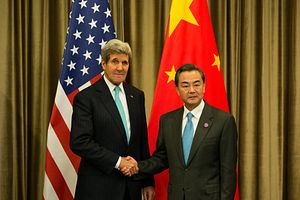Over the past month, protesters in Hong Kong have succeeded, despite Beijing’s best efforts, in creating and sustaining an unprecedented movement for democratic reform. Yet Hong Kong is unlikely to be feature much in President Obama’s trip to China this week. The trip’s primary purpose, after all, is economic: this year, Beijing plays host to the APEC Summit, an important gathering of trading leaders from across the Asia-Pacific region. Moreover, the Obama administration has raised the Hong Kong issue privately several times over the past few months, and the President offered a mild public rebuke on his first day in Beijing.
But the message was clear: Hong Kong, and democracy more generally, is peripheral rather than central to U.S.-China relations. By stopping there, the Obama administration risks missing what may turn out to be a landmark moment for Chinese politics. The gripping authoritarianism that seemed to define Xi’s China now promises to give rise to the country’s most important political movement in decades. Washington should go out on a limb, and press Beijing openly and consistently to allow universal suffrage and free elections in Hong Kong.
To be sure, doing so entails significant costs, and threatens to reverse some of the progress made in U.S.–China relations in recent years. Specifically, U.S. officials have recently softened their once-regular condemnations of China’s anti-democratic stance, as economic and security challenges have assumed greater importance, and both sides have come to the conclusion that little can be gained from further discussion on democracy and human rights. At the same time, China has made clear that it will tolerate no criticism regarding Hong Kong, which it regards as a purely internal matter. Any perceived American attempt to interfere with Beijing’s handling of the Hong Kong protests is likely to provoke a furious reaction from the Chinese government. But this time, it is worth the risk. The United States must stand up for democracy in Hong Kong by making the issue a central one in U.S.-China relations.
Hong Kong’s protests, which began in late September and have continued, despite Beijing’s best efforts, are of unprecedented significance both for the territory and the mainland itself. Instead of seeking to protect freedoms already enjoyed under their city-state’s special political status, as they had in the past, Hong Kongers have marched, chanted, and occupied to expand their political rights – specifically, to vote in free and open elections for Hong Kong’s Chief Executive. Hong Kong’s leaders are chosen indirectly, by a body composed primarily of economic elites, and whose appointment Beijing essentially controls. Surrendering such power to the masses, even in Hong Kong, is beyond the pale for the Chinese Communist Party. Yet Hong Kong’s demand for democracy has resonated in other parts of China: last week, Taiwanese leader Ma Ying-jeou linked the territory’s democratic movement with its own, expressing support for the protesters before adding that if Beijing itself were to embrace democratic reforms, Taiwan may well accept eventual reunification with the mainland.
This resonance creates an unsustainable tension, for it suggests that Hong Kong will not be the last large-scale civil protest that Beijing will have to confront. Beijing was betting that appeals to preserve Hong Kong’s reputation for stability and free enterprise rather than free-wheeling politics would prevent large-scale demonstrations, or at least marginalize protest leaders. In this it badly erred and in the process betrayed the error of the basic calculation that economic growth will neutralize calls for political reform. The territory’s widespread civil disobedience showed mainland China and the world that prosperity is no substitute for democracy, and that civic culture cannot survive by GDP growth alone. Although it may take quite a while, sooner or later Hong Kong-style protests will come to the mainland. Indeed, Hong Kong says much about how Beijing will respond to future calls for democratic reform: there will be no more Tiananmens, but there will be no compromise on the fundamentals, either.
Paradoxically, this tension also opens a window for Washington to engage the Chinese government on political reform. Even as Beijing is clearly in need of fresh thinking on the issue, Chinese President Xi Jinping, widely thought to be the most powerful leader since at least Deng Xiaoping, if not Mao himself, has appeared sincere in his pursuit of some important reforms, including upholding China’s constitution, which guarantees freedom of speech and assembly, among other basic rights. Given this combination of threat and opportunity, Beijing may well be receptive to a tactful attempt to re-engage on issues related to political reform.
Giving support to Hong Kong’s protesters while attempting to constructively engage Beijing will require delicate diplomacy, but it’s worth the effort. Ignoring the Hong Kong protests, on the other hand, as the Obama administration appears ready to do, risks sacrificing long-term strategic goals for short-term tactical wins. Whatever the direct outcome of last month’s civil disobedience, one thing is clear: we have seen the future of democratic protest in China, not just in Hong Kong, but on the mainland as well. For the United States, Hong Kong’s protests should solidify its resolve to promote democratic movements around the world, and President Obama must take that message to Beijing—not only this week, but for the remainder of his presidency.
Scott Moore is a Council on Foreign Relations International Affairs Fellow and a Research Associate at the Harvard Belfer Center on Science and International Affairs, where he specializes in Chinese politics.

































